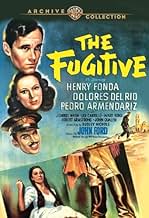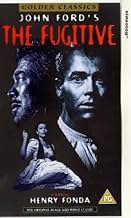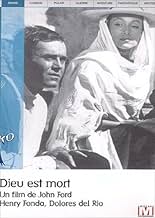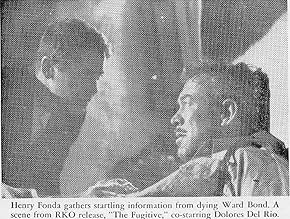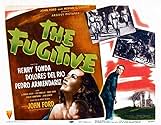NOTE IMDb
6,3/10
2,7 k
MA NOTE
Ajouter une intrigue dans votre langueAnti-Catholic and anti-cleric policies in the Mexican state of Tabasco lead the revolutionary government to persecute the state's last remaining priest.Anti-Catholic and anti-cleric policies in the Mexican state of Tabasco lead the revolutionary government to persecute the state's last remaining priest.Anti-Catholic and anti-cleric policies in the Mexican state of Tabasco lead the revolutionary government to persecute the state's last remaining priest.
- Réalisation
- Scénario
- Casting principal
- Récompenses
- 1 victoire et 2 nominations au total
Dolores Del Río
- An Indian Woman
- (as Dolores Del Rio)
Pedro Armendáriz
- A Lieutenant of Police
- (as Pedro Armendariz)
Chris-Pin Martin
- An Organ-Grinder
- (as Cris-Pin Martin)
Miguel Inclán
- A Hostage
- (as Miguel Inclan)
Fernando Fernández
- A Singer
- (as Fernando Fernandez)
Rodolfo Acosta
- Policeman
- (non crédité)
Mel Ferrer
- Father Serra
- (non crédité)
Jack Pennick
- Man
- (non crédité)
José Torvay
- Mexican
- (non crédité)
Avis à la une
Hmmm, let's see... we've got a movie about a Catholic priest trying to exercise his ministry in a Latin American country whose government has been taken over by an anticlerical revolutionary party,... he administers the sacraments to the devoutly believing people while trying to stay one step ahead of the law, which has hunted down every other priest in the country,... what do you this movie will be like?
In the hands of the crusty but sentimental John Ford, you might expect this movie to be some kind of hagiography, showing the priest as he performs his pastoral labors with fierce courage as well as with patient devotion, and anticipates his fate with Christian resignation. (This would be particularly apt if Pat O'Brien or Spencer Tracy played the priest.) You might also expect the people he serves will be portrayed as simple God-fearing people with stout hearts and no illusions about the true intentions of their political leaders. The government and its agents will be portrayed as cruel and cynical tyrants, ever ready to beat on the simple folk in the name of the greater good.
Fortunately, this is not the movie that Ford made. The actual movie is a good deal more complicated (and much, much better) than that. This is a balanced, intelligent account of a tragic situation born of centuries of misrule and oppression by tyrannical government working, sad to say, hand in glove with the Church that is supposed to comfort the afflicted and afflict the comfortable. Pedro Amendariz in particular gives a great performance as the revolutionary government official, who, whatever his opinions may be, passionately loves his country, and sincerely wants the best for his beleaguered people. Henry Fonda, as the priest, gives at one point a stunning assessment of his motives for what he does which turns any picture of a heroic shepherd on its ear.
This is one of John Ford's lesser known pictures - an unknown masterpiece.
In the hands of the crusty but sentimental John Ford, you might expect this movie to be some kind of hagiography, showing the priest as he performs his pastoral labors with fierce courage as well as with patient devotion, and anticipates his fate with Christian resignation. (This would be particularly apt if Pat O'Brien or Spencer Tracy played the priest.) You might also expect the people he serves will be portrayed as simple God-fearing people with stout hearts and no illusions about the true intentions of their political leaders. The government and its agents will be portrayed as cruel and cynical tyrants, ever ready to beat on the simple folk in the name of the greater good.
Fortunately, this is not the movie that Ford made. The actual movie is a good deal more complicated (and much, much better) than that. This is a balanced, intelligent account of a tragic situation born of centuries of misrule and oppression by tyrannical government working, sad to say, hand in glove with the Church that is supposed to comfort the afflicted and afflict the comfortable. Pedro Amendariz in particular gives a great performance as the revolutionary government official, who, whatever his opinions may be, passionately loves his country, and sincerely wants the best for his beleaguered people. Henry Fonda, as the priest, gives at one point a stunning assessment of his motives for what he does which turns any picture of a heroic shepherd on its ear.
This is one of John Ford's lesser known pictures - an unknown masterpiece.
John Ford's adaptation of Graham Greene's "The Power And The Glory" captures perfectly the potential for the seven deadly sins in all of us. It is an incredibly and understatedly raw and emotional and downright earthy movie. The entire supporting cast is brilliant, and Fonda, of course, is excellent, if not precisely ideal. This is in all senses, a quintessential study in soul-searching.
It's been written somewhere that the cruelest thing you can say to an artist is that his work is flawless. John Ford thought of the Fugitive as, despite not being a box-office success, a perfect film and one of his very favorites. It's perhaps more than prudent then to point out some of the criticisms one would have of the film (which, perhaps, is moot since he's been dead for decades). As a fan of the Ford work I've seen there are some times when he's touched perfection (Grapes of Wrath and the Searchers are it for me), and sometimes not so much, which goes without saying he directed many films. With the Fugitive it's recognizable to me why it's split its audience: some hail it as being totally underrated and a brilliant depiction of religious allegory and suffering, and some say that it's a total crock for being far too heavy-handed and acted over-the-top.
Both sides have their right points; it is an underrated picture, if only for its technical feats of cinematography (Gabriel Figueroa is just right for this kind of material for Ford) and Ford's usual talents as a basic storyteller with a tendency for pure cinema expression (i.e. lack of dialog is a plus with the emotion expressed through the camera and actors. But it is also not well-acted in a couple of instances, notably the beautiful but overbearing Delores Del-Rio as the woman living in the town who's baby is baptized by the Priest played by Henry Fonda. For Fonda, it should be said, he at least gives all he can for a performance that possibly other actors could have played with more magnificence. In fact it's for him that some of the picture is most watchable, as he flexes his emotional chops for a scene where it's required for complexity like when he misses the boat and is asked to bless someone dying only to realize there is no wine and must go to ask from a vulgarian for wine (which, as it turns out, is drunken with brandy and all by him).
While it might not be the Fonda we all know and love from Grapes of Wrath or My Darling Clementine he does what he can with the part, and it's a tribute to him and Ford that they make it engrossing on a very simple level that carries some complex connotations. When focusing on the actual chase and flight from the Mexican police it works very well (particularly with a hammy but effective informer played by J. Carrol Nash). It's just when Ford over-indulges in the spiritual aspect of the picture, which is only made clearer towards the end, that it loses its footing. Indeed the start of the picture kind of threw me off for a little bit as Fonda comes in with the Christ-like symbolism highlighted on the wall, and the townspeople come in with tears in their eyes and a somber song to sing and Fonda blesses and baptizes others. I wondered: is this a little TOO much in the way of what Ford does best, which is telling the story? He can be brilliant in throwing in his deep-rooted Catholic ideas as pure visions on the screen, and once or twice in the Fugitive he does... and then other times it falls flat or goes too high where it starts to become a full-blown religious picture as opposed to a societal thriller.
Should Ford fans see it? Of course; even a lessor Ford picture will have something interesting. Will everyone like it? Surely not. Yet it is usually fine, traditional work and shouldn't be completely dismissed.
Both sides have their right points; it is an underrated picture, if only for its technical feats of cinematography (Gabriel Figueroa is just right for this kind of material for Ford) and Ford's usual talents as a basic storyteller with a tendency for pure cinema expression (i.e. lack of dialog is a plus with the emotion expressed through the camera and actors. But it is also not well-acted in a couple of instances, notably the beautiful but overbearing Delores Del-Rio as the woman living in the town who's baby is baptized by the Priest played by Henry Fonda. For Fonda, it should be said, he at least gives all he can for a performance that possibly other actors could have played with more magnificence. In fact it's for him that some of the picture is most watchable, as he flexes his emotional chops for a scene where it's required for complexity like when he misses the boat and is asked to bless someone dying only to realize there is no wine and must go to ask from a vulgarian for wine (which, as it turns out, is drunken with brandy and all by him).
While it might not be the Fonda we all know and love from Grapes of Wrath or My Darling Clementine he does what he can with the part, and it's a tribute to him and Ford that they make it engrossing on a very simple level that carries some complex connotations. When focusing on the actual chase and flight from the Mexican police it works very well (particularly with a hammy but effective informer played by J. Carrol Nash). It's just when Ford over-indulges in the spiritual aspect of the picture, which is only made clearer towards the end, that it loses its footing. Indeed the start of the picture kind of threw me off for a little bit as Fonda comes in with the Christ-like symbolism highlighted on the wall, and the townspeople come in with tears in their eyes and a somber song to sing and Fonda blesses and baptizes others. I wondered: is this a little TOO much in the way of what Ford does best, which is telling the story? He can be brilliant in throwing in his deep-rooted Catholic ideas as pure visions on the screen, and once or twice in the Fugitive he does... and then other times it falls flat or goes too high where it starts to become a full-blown religious picture as opposed to a societal thriller.
Should Ford fans see it? Of course; even a lessor Ford picture will have something interesting. Will everyone like it? Surely not. Yet it is usually fine, traditional work and shouldn't be completely dismissed.
I was attracted to this movie because of Henry Fonday, Dolores del Rio, and John Ford, all of whom I'm a fan. But this movie was just so WEIRD. From the start, I felt like I had joined the movie in the middle. The dramatic music along the walk and as he enters the church - it feels like a crucial point in a movie, but we don't even know what's going on yet. There are long periods with no dialogue, almost has the feel of a silent movie at times.
I found the whole movie depressing without any redeeming character development that would have made me sympathize with the characters. Why is Fonda, a white priest, even in this country in the first place? It's never explained. And he lets everyone take the fall for him. He's not likable or relatable in any way to me.
I found the whole movie depressing without any redeeming character development that would have made me sympathize with the characters. Why is Fonda, a white priest, even in this country in the first place? It's never explained. And he lets everyone take the fall for him. He's not likable or relatable in any way to me.
This excellent and dramatic movie , a co-production US-Mexico , is based on Graham Greene novel and written by Dudley Nichols . It starts when a priest (Henry Fonda) attempting to flee from a Centroamerican country , because Christianity being pursued by a totalitarian govern . He encounters help by an Indian woman (Dolores Del Rio) with a baby . She gives him direction to port where he could embark towards freedom . Meanwhile , he finds a mean countryman (J Carrol Naish) craving reward and is pursued by an authoritarian officer (Pedro Armendariz). Furthermore , his existence runs parallel a bank robber , The Gringo (War Bond) also relentlessly pursued .
Magnificent movie featuring awesome performances by complete casting . The film develops some John Ford's usual themes , as the sentimental nostalgia , sense of camaraderie , religion , and abound touching scenes . Henry Fonda in a larger-than-life role as a good priest is top-notch , Pedro Armendariz as a nasty general is perfect and War Bond as outlaw wanted by totalitarian police is cool . Fonda (Grapes of wrath , Drums along the Mohawk , Young Mr. Lincoln) and Pedro Armendariz (3 Godfathers , Fort Apache) played several films for John Ford . Besides , there appears Ford's habitual friends , someone uncredited , such as Jack Pennick , Rodolfo Acosta , John Qualen , Fortunio Bonanova , J Carrol Naish, Mel Ferrer's first film and the opening narration is by Ward Bond , who also plays an important role in the film . Luxurious cinematography in lights and darks by Gabriel Figueroa (usual of director Emilio Fernandez , here also producer) . Enjoyable musical score by Richard Hageman , adding Mexican songs with emotive dance included in charge of Dolores Del Rio . The picture shot in Mexico , was produced by Ford's Argosy Production Company , RKO pictures and Merian C. Cooper . Rating : Better than average , well worth seeing for John Ford enthusiasts .
Magnificent movie featuring awesome performances by complete casting . The film develops some John Ford's usual themes , as the sentimental nostalgia , sense of camaraderie , religion , and abound touching scenes . Henry Fonda in a larger-than-life role as a good priest is top-notch , Pedro Armendariz as a nasty general is perfect and War Bond as outlaw wanted by totalitarian police is cool . Fonda (Grapes of wrath , Drums along the Mohawk , Young Mr. Lincoln) and Pedro Armendariz (3 Godfathers , Fort Apache) played several films for John Ford . Besides , there appears Ford's habitual friends , someone uncredited , such as Jack Pennick , Rodolfo Acosta , John Qualen , Fortunio Bonanova , J Carrol Naish, Mel Ferrer's first film and the opening narration is by Ward Bond , who also plays an important role in the film . Luxurious cinematography in lights and darks by Gabriel Figueroa (usual of director Emilio Fernandez , here also producer) . Enjoyable musical score by Richard Hageman , adding Mexican songs with emotive dance included in charge of Dolores Del Rio . The picture shot in Mexico , was produced by Ford's Argosy Production Company , RKO pictures and Merian C. Cooper . Rating : Better than average , well worth seeing for John Ford enthusiasts .
Le saviez-vous
- GaffesWhen the Priest is on line getting ready to board a ship, he is approached by a young boy that was baptized by him. The boy informs him that his mother is dying and wishes for the priest to come home with him to give her the last rites. What is not explained is how did the boy just happen to know that the priest was in town and getting ready to board a ship at that precise moment and in the third class section.
- Citations
A Lieutenant of Police: [Looking at news clipping] You can tell he's a priest by the collar, that's all.
A Chief of Police: Not a very good picture, but it's what we got.
A Lieutenant of Police: They all look alike to me. I've shot him a dozen times.
- ConnexionsFeatured in John Ford (1992)
- Bandes originalesBury Me Not on the Lone Prairie
("The Dying Cowboy") (uncredited)
American folk ballad based on an older sea song (1932)
Variation heard as theme for the Gringo (Ward Bond)
Meilleurs choix
Connectez-vous pour évaluer et suivre la liste de favoris afin de recevoir des recommandations personnalisées
- How long is The Fugitive?Alimenté par Alexa
Détails
Box-office
- Budget
- 1 500 000 $US (estimé)
- Durée1 heure 44 minutes
- Couleur
- Rapport de forme
- 1.37 : 1
Contribuer à cette page
Suggérer une modification ou ajouter du contenu manquant

Lacune principale
By what name was Dieu est mort (1947) officially released in India in English?
Répondre
